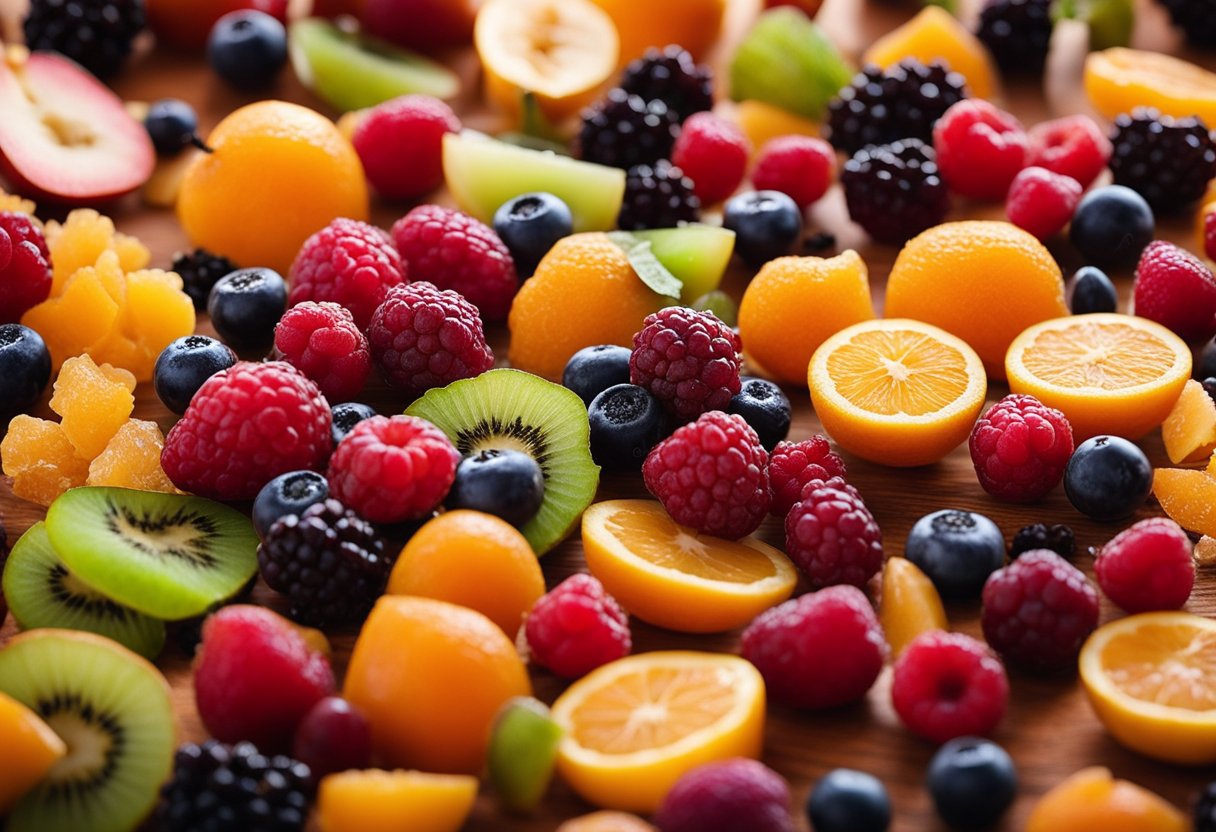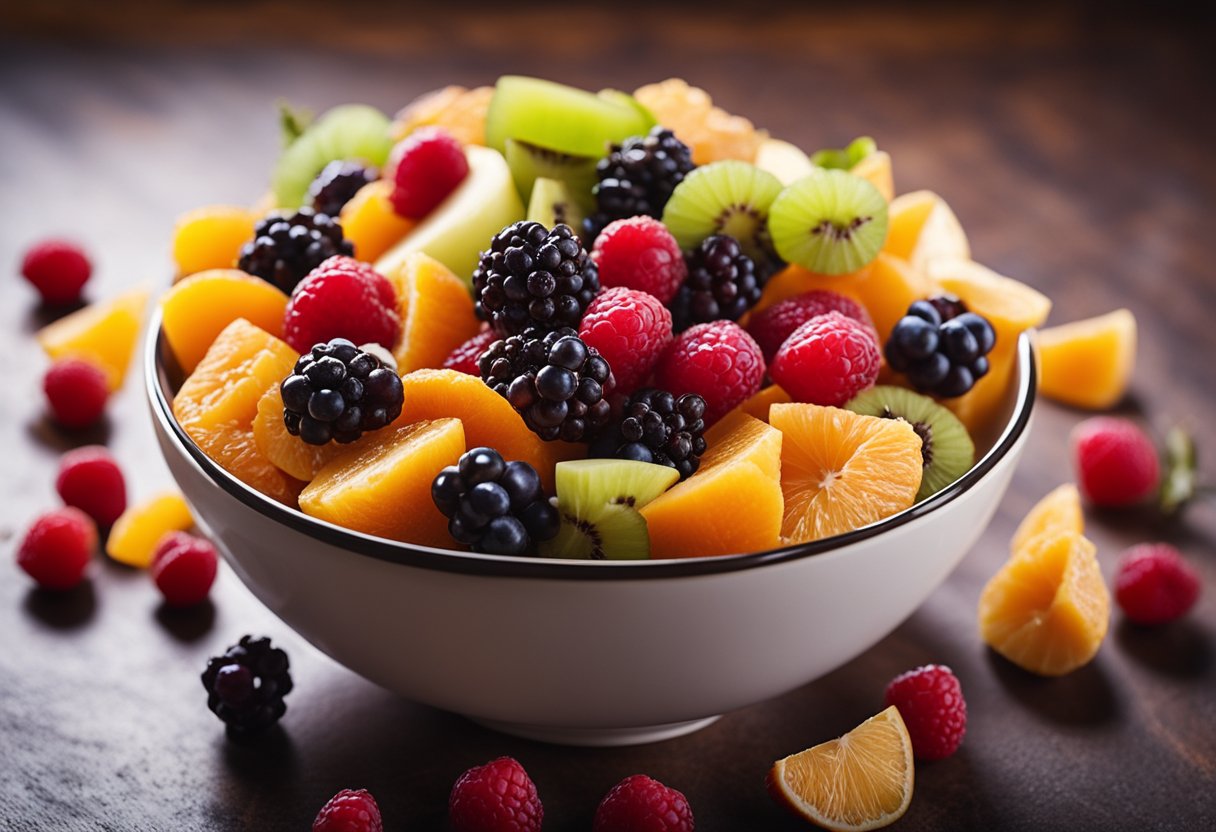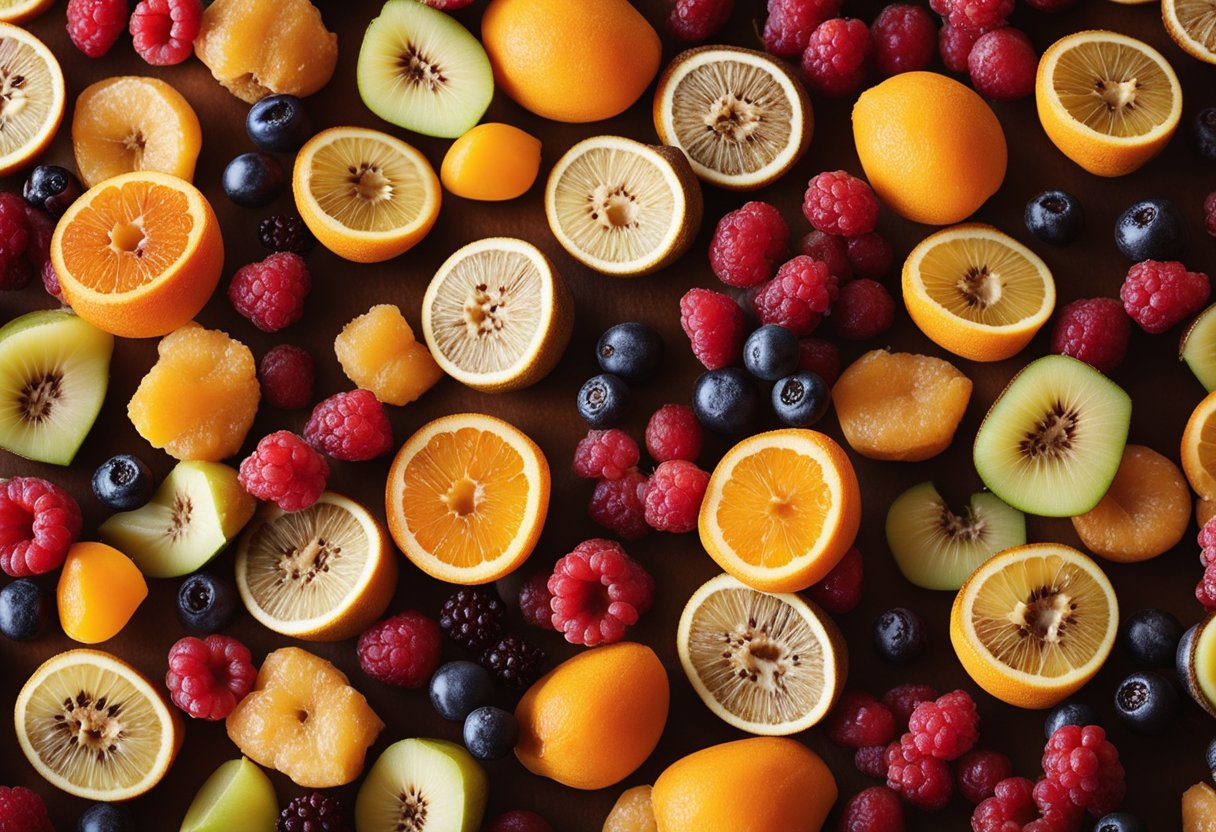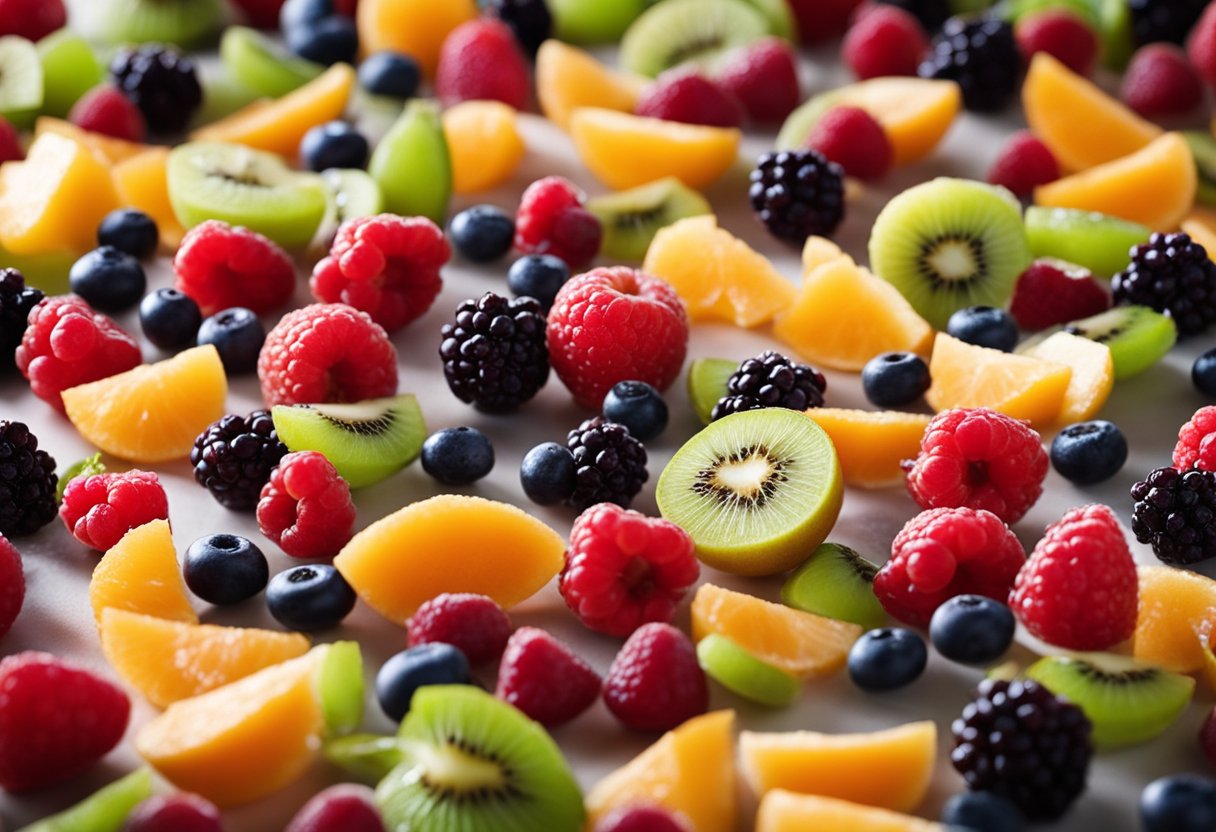As a health-conscious individual, you may have come across freeze-dried fruit as a snack option. Freeze-drying is a process that removes moisture from fruits and vegetables, leaving behind a crispy, nutrient-dense snack. While it may seem like a healthy option, you may be wondering if freeze-dried fruit is bad for you.
In this article, I will explore the nutritional value of freeze-dried fruit, its potential health implications, and whether it’s a good option for weight management.

Understanding Freeze-Dried Fruit Freeze-drying is a process that involves freezing the fruit and then removing the moisture through a vacuum. This process preserves the nutrients and flavor of the fruit, making it a popular snack option.
Freeze-dried fruit has a long shelf life and can be stored for months without refrigeration. It’s also lightweight and easy to pack, making it a convenient snack for on-the-go.
Nutritional Comparison: Fresh vs Freeze-Dried Fruit Fresh fruit is an excellent source of vitamins, minerals, and fiber. However, freeze-dried fruit is also a nutrient-dense snack. In fact, freeze-drying can preserve up to 97% of the nutrients in fruits and vegetables.
While fresh fruit may have a higher water content, freeze-dried fruit can offer a concentrated source of nutrients. However, it’s important to note that freeze-dried fruit may contain added sugars, which can impact its nutritional value.
Key Takeaways
- Freeze-dried fruit is a nutrient-dense snack that has a long shelf life and is easy to pack.
- Freeze-drying can preserve up to 97% of the nutrients in fruits and vegetables.
- Freeze-dried fruit may contain added sugars, which can impact its nutritional value.
Understanding Freeze-Dried Fruit
As someone who has been interested in healthy eating and nutrition for a long time, I have always been curious about freeze-dried fruit. What is it, and is it bad for you? Here’s what I’ve learned.
Freeze-drying is a process that removes moisture from food, leaving it in a dehydrated state. This is done by placing the food in a vacuum chamber and lowering the pressure, which causes the moisture to evaporate.
The process is called sublimation, and it results in a product that is lightweight, shelf-stable, and retains much of its original flavor and nutritional value.
The process of freeze-drying fruit begins with selecting ripe, fresh fruit. The fruit is then washed, sliced, and flash-frozen.
The frozen fruit is then placed in a vacuum chamber, where the pressure is lowered, and the temperature is raised. This causes the frozen water in the fruit to evaporate, leaving behind a dry, lightweight product.
One of the benefits of freeze-dried fruit is that it retains much of its nutritional value. According to a registered dietitian at Green Chef, the freeze-drying process removes 99% of moisture from the fruit, without ever having to enter a liquid phase.
This means that the fruit retains much of its original vitamins, minerals, and antioxidants.
Another benefit of freeze-dried fruit is its convenience. Because it is lightweight and shelf-stable, it can be stored for long periods of time without refrigeration.
This makes it a great option for camping trips, hiking, or other outdoor activities. Additionally, freeze-dried fruit can be added to smoothies, oatmeal, or yogurt for a quick and easy snack.
Overall, freeze-dried fruit is a convenient and nutritious option for those who are looking for a healthy snack. While it may not be as fresh as fresh fruit, it retains much of its nutritional value and is a great option for those who are on the go.
Nutritional Comparison: Fresh vs Freeze-Dried Fruit
When it comes to comparing the nutritional value of fresh and freeze-dried fruit, there are a few key differences to consider.
While fresh fruit is often praised for its high water content and abundance of vitamins and minerals, freeze-dried fruit offers a longer shelf life and convenience that can be appealing to some consumers.
One of the main differences between fresh and freeze-dried fruit is their water content. Fresh fruit contains a high percentage of water, which can make it a refreshing and hydrating snack.
Freeze-dried fruit, on the other hand, has had most of its water content removed during the drying process. This can make it more concentrated in terms of nutrients, but also means that it may not be as hydrating as fresh fruit.
In terms of nutrients, both fresh and freeze-dried fruit can be good sources of vitamins, minerals, and antioxidants.
However, freeze-dried fruit may actually have higher levels of certain nutrients due to the concentration that occurs during the drying process. For example, freeze-dried fruit may have higher levels of vitamin C and other water-soluble nutrients than fresh fruit.
One area where fresh fruit may have an advantage is in its fiber content. Fresh fruit typically contains more fiber than freeze-dried fruit, as the drying process can cause some of the fiber to break down or be lost.
However, freeze-dried fruit can still be a good source of fiber, especially if it is made from whole fruit with the skin intact.
It is also worth noting that some freeze-dried fruit products may contain added sugars, so it is important to read the label carefully. However, many freeze-dried fruit products are made with natural sugars and no added sweeteners, making them a healthy snack option.
Overall, both fresh and freeze-dried fruit can be part of a healthy diet. While fresh fruit may be more hydrating and contain more fiber, freeze-dried fruit can offer a concentrated source of nutrients and a longer shelf life.
Health Implications of Freeze-Dried Fruit
As a nutritionist, I often get asked whether freeze-dried fruit is a healthy snack option. While freeze-dried fruit is a convenient and nutrient-dense snack, it’s important to understand its health implications.
Firstly, freeze-dried fruit is a type of dried fruit that has been dehydrated and has had most of its water content removed through a process called sublimation. This process helps preserve the fruit’s nutrients, including vitamins and minerals, making it a nutritious snack.
However, it’s important to note that freeze-dried fruit does have some health implications. For instance, it lacks the fiber content that fresh fruit has, which is an essential nutrient for maintaining a healthy digestive system.
Additionally, freeze-dried fruit tends to be higher in sugar content than fresh fruit, which can be problematic for individuals with diabetes or those trying to maintain healthy blood sugar levels.
On the other hand, freeze-dried fruit is rich in phytonutrients, which are plant compounds that have been shown to have numerous health benefits. These compounds have been linked to reducing the risk of cancer, heart disease, and diabetes, among other health conditions.
When it comes to snacking, it’s important to choose nutritious options that will help fuel your body. Freeze-dried fruit is a healthy snack option, but it’s important to consume it in moderation and as part of a balanced diet.
In summary, freeze-dried fruit is a convenient and nutrient-dense snack option. While it lacks fiber content and can be high in sugar, it is rich in phytonutrients that have numerous health benefits. As with any snack, it’s important to consume freeze-dried fruit in moderation and as part of a balanced diet.
Impact of Sugar in Freeze-Dried Fruit
As a registered dietitian, I am often asked about the health benefits of freeze-dried fruit. One common concern is the sugar content in freeze-dried fruit. While it is true that freeze-dried fruit contains natural sugars, it is important to understand the impact of these sugars on our health.
First, it is important to note that freeze-dried fruit does not contain added sugars. Unlike many processed foods, which often have added sugars to enhance their taste, freeze-dried fruit is simply fruit that has been dehydrated.
This means that the natural sugars found in the fruit are concentrated, but no extra sugar has been added.
Second, the sugar content in freeze-dried fruit is not necessarily a cause for concern. While it is true that consuming too much sugar can lead to weight gain and other health issues, the natural sugars found in fruit are not the same as added sugars.
Natural sugars are accompanied by fiber, vitamins, and minerals that are essential for good health.
Third, freeze-dried fruit can be a good choice for people with diabetes. While it is important for people with diabetes to monitor their sugar intake, freeze-dried fruit can be a healthy snack option.
The natural sugars found in fruit are broken down more slowly in the body than added sugars, which can help prevent blood sugar spikes.
In conclusion, while freeze-dried fruit does contain natural sugars, it is not a cause for concern.
The sugar content in freeze-dried fruit is not the same as added sugars found in processed foods, and the natural sugars in fruit are accompanied by fiber, vitamins, and minerals that are essential for good health. Freeze-dried fruit can also be a healthy snack option for people with diabetes.
Weight and Portion Considerations

When it comes to snacking, portion control is key. While freeze-dried fruit can be a healthy snack option, it’s important to be mindful of the weight and portion size.
One benefit of freeze-dried fruit is that it is lightweight and easy to carry, making it a great option for on-the-go snacking. However, it’s important to note that some brands may add sugar or other sweeteners, which can increase the calorie count.
For those watching their weight, it’s important to pay attention to the calorie content of freeze-dried fruit. While some brands may be low in calories, others may be higher, so it’s important to read the label and choose a brand that fits within your calorie goals.
In general, freeze-dried fruit can be a healthy snack option for those looking to maintain a healthy weight. It’s a good source of fiber and nutrients, and can help satisfy a sweet tooth without the added sugar and calories of other snacks.
Overall, freeze-dried fruit can be a part of a healthy diet, but it’s important to be mindful of portion sizes and choose a brand that fits within your calorie goals.
Specific Fruits Analysis

Apples
Apples are a great source of fiber and vitamin C. According to Eat This Not That, freeze-dried apples maintain most of their nutrients, except for fiber and vitamin C. However, fresh apples are still the best way to get the most nutritional value from your meals.
Bananas
Bananas are a good source of fiber, potassium, and vitamin C. Freeze-dried bananas maintain most of their nutrients, according to Green Matters. However, fresh bananas are still the best way to get the most nutritional value from your meals.
Strawberries
Strawberries are a good source of fiber, vitamin C, and antioxidants. Freeze-dried strawberries maintain most of their nutrients, according to The Conversation. However, fresh strawberries are still the best way to get the most nutritional value from your meals.
Raspberries
Raspberries are a good source of fiber, vitamin C, and antioxidants. Freeze-dried raspberries maintain most of their nutrients, according to The Conversation. However, fresh raspberries are still the best way to get the most nutritional value from your meals.
Pineapples
Pineapples are a good source of fiber, vitamin C, and vitamin A. Freeze-dried pineapples maintain most of their nutrients, according to Eat This Not That. However, fresh pineapples are still the best way to get the most nutritional value from your meals.
Mangoes
Mangoes are a good source of fiber, vitamin C, and vitamin A. Freeze-dried mangoes maintain most of their nutrients, according to Eat This Not That. However, fresh mangoes are still the best way to get the most nutritional value from your meals.
Blueberries
Blueberries are a good source of fiber, vitamin C, and antioxidants. Freeze-dried blueberries maintain most of their nutrients, according to The Conversation. However, fresh blueberries are still the best way to get the most nutritional value from your meals.
Peaches
Peaches are a good source of fiber, vitamin C, and vitamin A. Freeze-dried peaches maintain most of their nutrients, according to Eat This Not That. However, fresh peaches are still the best way to get the most nutritional value from your meals.
Pears
Pears are a good source of fiber, vitamin C, and potassium. Freeze-dried pears maintain most of their nutrients, according to Eat This Not That. However, fresh pears are still the best way to get the most nutritional value from your meals.
Using Freeze-Dried Fruit in Meals and Snacks
As someone who enjoys healthy meals and snacks, I have found that freeze-dried fruit is a great option to incorporate into my diet. With its long shelf life and nutrient retention, it’s an easy way to add flavor and nutrition to many meals and snacks.
One way I like to use freeze-dried fruit is in trail mix. I mix it with nuts and seeds for a healthy snack that’s perfect for on-the-go. It’s also a great addition to cereal and oatmeal for a tasty and nutritious breakfast.
Freeze-dried fruit can also be used in baking. Whether you’re making muffins, bread, or even a fruit tart, freeze-dried fruit adds a burst of flavor without the added moisture that fresh fruit can bring. You can either use the whole fruit slices or a fruit powder, depending on the recipe.
Here are some ideas for incorporating freeze-dried fruit into your meals and snacks:
- Mix it with nuts and seeds for a healthy trail mix
- Add it to your favorite cereal or oatmeal for a tasty breakfast
- Use it in baking for a burst of flavor in muffins, bread, or even a fruit tart
- Sprinkle it on top of yogurt or smoothie bowls for added crunch and flavor
- Use it as a topping for ice cream or frozen yogurt for a healthier dessert option
Overall, freeze-dried fruit is a great option for adding flavor and nutrition to your meals and snacks. Just be mindful of portion sizes, as it can be easy to overdo it with the sweet and fruity taste.
Preservation and Shelf Life
As someone who enjoys freeze-dried fruits, I am often asked about their preservation and shelf life. One of the biggest advantages of freeze-drying is that it allows for longer shelf life compared to fresh fruits.
This is because most of the moisture has been removed during the process, which is the main cause of food spoilage.
According to PrepSOS.com, freeze-dried fruit can last for up to 25 years if stored properly. This makes it a great option for emergency food storage or for those who want to stock up on fruits without worrying about them going bad quickly.
In terms of storage, freeze-dried fruits can be stored in a pantry or cupboard, as long as they are kept in an airtight container away from moisture. It is also important to note that once the package has been opened, the fruit should be consumed within a reasonable time frame.
It is worth mentioning that dehydration can also be a method of preserving fruits. However, unlike freeze-drying, dehydration does not remove all the moisture from the fruit, which means it has a shorter shelf life.
According to a knowledge article from USDA, dried fruits such as apricots, prunes, and raisins can last up to six months in the pantry. After opening, it is recommended to store them tightly sealed in the refrigerator to preserve their quality for up to six additional months.
In conclusion, freeze-drying is an effective method of preserving fruits and extending their shelf life. Proper storage is key to maintaining the quality and freshness of the fruit.
It is important to keep in mind that while freeze-dried fruits can last for a long time, they should still be consumed within a reasonable time frame once the package has been opened.
Freeze-Dried vs Dehydrated Fruit
When it comes to preserving fruit, there are two main methods: freeze-drying and dehydration. Both methods remove moisture from the fruit, but they differ in the way they do it.
Dehydrated fruit is made by removing moisture from the fruit using heat. This process can be done in an oven, a dehydrator, or even in the sun. The goal is to remove enough moisture from the fruit to prevent it from spoiling, but not so much that it becomes brittle or loses its flavor.
Freeze-dried fruit, on the other hand, is made by first freezing the fruit and then removing the moisture using a vacuum chamber. The frozen fruit is placed in the chamber, and the pressure is lowered, causing the ice to sublimate (turn from a solid to a gas) and be removed.
One of the biggest differences between freeze-dried and dehydrated fruit is the moisture content. Freeze-dried fruit has a much lower moisture content than dehydrated fruit, which makes it much lighter and easier to store. It also means that freeze-dried fruit has a longer shelf life than dehydrated fruit.
Another difference between the two methods is the texture of the fruit. Dehydrated fruit tends to be chewy and leathery, while freeze-dried fruit is crunchy and airy. Which texture you prefer is largely a matter of personal taste.
In terms of nutrition, both freeze-dried and dehydrated fruit are good sources of vitamins and minerals. However, some studies suggest that freeze-dried fruit may retain more of its nutrients than dehydrated fruit.
This is because the freeze-drying process is gentler and doesn’t expose the fruit to as much heat as dehydration does.
Overall, both freeze-dried and dehydrated fruit can be healthy snacks. However, it’s important to choose brands that don’t add sugar or other unhealthy ingredients. It’s also important to keep in mind that neither method of preserving fruit can replace fresh fruit in terms of flavor and nutrition.
Frequently Asked Questions

What are the health benefits of freeze-dried fruit?
Freeze-dried fruit can be a great source of vitamins, minerals, and fiber. According to Eat This Not That, freeze-dried fruit can be an excellent way to get your daily dose of fruit, especially when fresh fruit is not available.
Freeze-drying helps preserve the nutritional value of the fruit, making it a healthy snack option.
How does freeze-drying affect the nutritional value of fruit?
Freeze-drying removes the water from the fruit, which concentrates the nutrients. This means that freeze-dried fruit can have higher levels of vitamins and minerals than fresh fruit.
However, the process of freeze-drying can also cause some loss of nutrients, such as vitamin C. Overall, freeze-dried fruit can be a healthy snack option, but it is important to remember that it should not be the only source of fruit in your diet.
What are the recommended serving sizes for freeze-dried fruit?
The recommended serving size for freeze-dried fruit is typically around 1/4 to 1/2 cup. However, it is important to check the nutrition label of the specific brand you are consuming, as serving sizes can vary.
It is also important to remember that freeze-dried fruit can be high in sugar, so it is best to consume it in moderation.
Are there any downsides to eating freeze-dried fruit?
One potential downside to eating freeze-dried fruit is that it can be high in sugar. According to WebMD, a 1/4 cup serving of freeze-dried fruit can contain up to 18 grams of sugar.
Additionally, some brands may add preservatives or other additives to their freeze-dried fruit. It is important to read the nutrition label and ingredient list before consuming.
Can freeze-dried fruit be a part of a healthy diet?
Yes, freeze-dried fruit can be a part of a healthy diet when consumed in moderation. It is important to remember that freeze-dried fruit should not be the only source of fruit in your diet, as fresh or frozen fruit is typically a better option.
Additionally, it is important to choose brands that do not add preservatives or other additives to their freeze-dried fruit.
Are there any additives or preservatives in freeze-dried fruit?
Some brands of freeze-dried fruit may add preservatives or other additives to their products. It is important to read the ingredient list before consuming to ensure that you are choosing a brand that does not add any unwanted ingredients.







